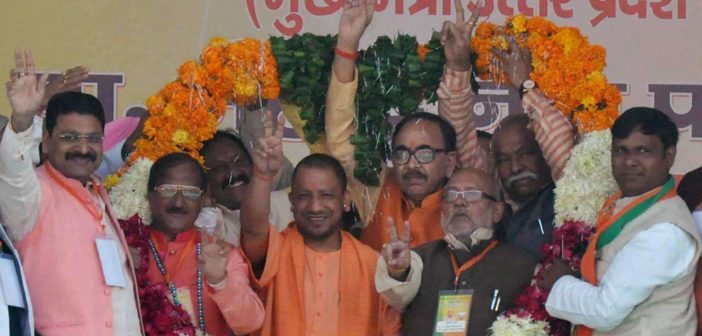If experts are to be believed, overall, with the 2019 Lok Sabha elections a year and a half away, the numbers do not look encouraging for the Bahujan Samaj Party (BSP), the Samajwadi Party (SP) and the Congress. The BJP’s performance is in line with the wave of support that swept it to power in the Assembly elections earlier this year. Even in the last civic elections of 2012, the BJP had led other parties by a long way in races for posts of both Mayor and Nagapalika Parishad Adhyaksha, Reports Aruna Sharma in Governance Democracy&Politics (GDP), December Issue
Grand Party of India has registered a thumping win in the crucial UP civic body elections, which clearly gave a thumps up to the 8 month rule of CM Yogi Adityanath in the state. As far as mayor elections is concerned, BJP has literally swept the elections by winning 14 of 16 Mayor seats in the big cities of the state, while BJP made a comeback of sorts by winning other 2 mayor seats in state. Biggest blow came to Samajwadi Pary and Congress as they remained seat less in the state, as far as Mayor seats are concerned. BJP’s continued dominance in the contests for Nigam Parshads of municipal corporations as well in the big cities. On the other hand Independent candidates won largest share of seats in Nagarpalika Parishads and Nagar Panchayats.
The BJP won the mayoral seats in Varanasi, Gorakhpur, Ghaziabad, Bareilly, Agra, Firozabad, Ayodhya, Mathura, Lucknow, Kanpur, Saharanpur, Jhansi, Bareilly and Moradabad while the Bahujan Samaj Party (BSP) won in Aligarh and Meerut.
If experts are to be believed, overall, with the 2019 Lok Sabha elections a year and a half away, the numbers do not look encouraging for the Bahujan Samaj Party (BSP), the Samajwadi Party (SP) and the Congress. The BJP’s performance is in line with the wave of support that swept it to power in the Assembly elections earlier this year. Even in the last civic elections of 2012, the BJP had led other parties by a long way in races for posts of both Mayor and Nagapalika Parishad Adhyaksha (Chairperson of the Municipal Board). It won 10 out of 12 Mayoral races in 2012, and marginally improved upon its strike rate this year, winning 14 out of 16 posts of Mayor.
The BSP did better than its reputation of being weak in the cities, winning the other two posts of Mayor, even though party chief Mayawati stayed away entirely from the campaign. Chief Minister Yogi Adityanath, on the other hand, threw himself fully into electioneering. One of the two Independent winners in the Mayoral elections of 2012 (for the Allahabad Municipal Corporation), too, had been supported by the BSP. In 2017, however, over 73% of BSP candidates for Mayor and Municipal Board Chairperson lost their security deposits.
Importantly, this was the first time that the BSP and SP fielded candidates on their party symbols in the civic elections — and barring the two Mayoral contests for the municipal corporations of Meerut and Aligarh, the SP won more seats than the BSP in the elections for the posts of Nigam Parshad, Nagarpalika Parishad Adhyaksha, Nagar Palika Parishad member, Nagar Panchayat Adhyaksha, and Nagar Panchayat member.
The SP, too, was battered by the BJP’s victories — 51% of SP candidates for Mayor and Chairperson forfeited their security deposits. The party, however, won 45 seats of Nagar Palika Chairperson (against the BJP’s 70), and 83 of Nagar Panchayat Adhyaksha (against the BJP’s 100). In 2012, a candidate supported by the SP had won the Mayor’s election in Bareilly, but contesting this year on the SP symbol, he lost.
The Congress, the BJP’s traditional rival in the civic elections, won only a few of seats in all categories of elections. From 15 Nagar Palika Chairpersons and 21 Nagar Panchayat Chairpersons in 2012, the party fell to 9 and 17 respectively. Nearly 87% of party candidates lost their deposits.
Independent candidates and small parties such as All India Majlis-e-Ittehadul Muslimeen (AIMIM) performed well in the civic polls. AIMIM won two municipal corporation seats, six council seats, one nagar panchayat chairman seat and six of its candidates got elected as nagar panchayat members. The Aam Aadmi Party (AAP), which contested the civic polls in UP for the first time, saw 14 of its candidates winning as councillors. Two won the nagar panchayat chairman poll and 19 got elected as nagar panchayat members.
On the othe hand, in 2012, Independent candidates had won 130 posts of Nagar Palika Parishad Adhyaksha and 352 of Nagar Panchayat Adhyaksha. In 2017, Independents could win only 43 posts of Nagar Palika Parishad Chairperson and 182 of Nagar Panchayat Adhyaksha. Over 90% of Independent candidates for Mayor and Chairperson lost their deposits. This decline in the performance of Independents was due to the SP and BSP putting up candidates on their party symbols.
Overall, in the 652 urban local bodies that include corporators and members of Nagar Palikas and Nagar Panchayats, the BJP’s vote share was 30.8%, the SP’s 18%, the BSP’s 14.3%, and the Congress’s 10%. Independents got 20.4% of the total vote. The results are alarming for the SP, which is looking for a revival under Akhilesh Yadav. A majority of SP candidates in Muslim-dominated Mayoral constituencies claimed that the minority community had voted BSP. Akhilesh stayed away from canvassing, only issuing an appeal in the media seeking votes for his party.
Mayawati held a state-level meeting last month in Lucknow regarding preparations for the polls, and asked the cadre to take the elections seriously. She had a smile on her face after the results were declared, and said that at the two Mayoral contests the BSP won, all sections of society, and especially Dalits and Muslims, had voted for the party. This same Muslim-Dalit formula had helped the BSP in 2007, when it won the Assembly elections with a clear majority. In 2014, however, the BSP was blown away by the Modi wave, and its tally in the Assembly is now down to just 19 seats.
The BJP, for the first time, released a sankalp patra for the civic polls, which sent the Congress scurrying to release a manifesto with promises of shamshan (cremation ground) and kabristan (graveyard), and a list of star campaigners. With the exception of party state chief Raj Babbar, however, no senior leader came out to campaign. The Congress faced defeats in party vice-president Rahul Gandhi’s Lok Sabha constituency Amethi. The BJP gave almost 95% tickets to fulltime party workers, among whom murmurs of being “neglected” were beginning to be heard. It is crucial for the BJP to keep the cadre intact before the 2019 Lok Sabha elections.
The civic poll results have established Adityanath as a “BJP leader”. He led the campaign and addressed more than 30 public meetings. Until 2012, he had been skipping the BJP’s important meetings, criticising the party’s decision on some occasions, and had even announced he would not campaign for party candidates in the 2012 Assembly elections. This time, workers of his Hindu Yuva Vahini were mostly denied tickets, but there were no rebel candidates or audible voices of discontent.
The BJP kept its agenda of Hindutva alive, with Adityanath highlighting the grand celebration of Diwali in Ayodhya during the campaign. The Adityanath government has upgraded Ayodhya and Mathura to municipal corporations, and won both Mayoral seats. A clutch of smaller parties debuted in the elections, including the AIMIM and AAP, winning a handful of seats.





